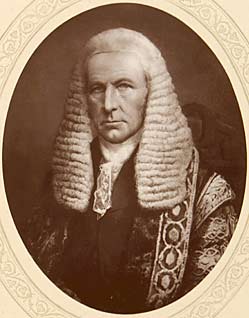Speaker Denison's Rule on:
[Wikipedia]
[Google]
[Amazon]
 Speaker Denison's rule is a constitutional convention established by
Speaker Denison's rule is a constitutional convention established by
List of all votes decided by the Speaker's casting vote since 1801
Constitution of the United Kingdom House of Commons of the United Kingdom Westminster system
 Speaker Denison's rule is a constitutional convention established by
Speaker Denison's rule is a constitutional convention established by John Evelyn Denison
John Evelyn Denison, 1st Viscount Ossington, PC (27 January 1800 – 7 March 1873) was a British statesman who served as Speaker of the House of Commons from 1857 to 1872. He is the eponym of Speaker Denison's rule.
Background and education
D ...
, who was Speaker of the British House of Commons
The speaker of the House of Commons is the presiding officer of the House of Commons, the lower house and primary chamber of the Parliament of the United Kingdom. The current speaker, Sir Lindsay Hoyle, was elected Speaker on 4 November 201 ...
from 1857 to 1872, regarding how the Speaker decides on their casting vote
A casting vote is a vote that someone may exercise to resolve a tied vote in a deliberative body. A casting vote is typically by the presiding officer of a council, legislative body, committee, etc., and may only be exercised to break a deadlock ...
in the event of a tie in the number of votes cast in a division
Division or divider may refer to:
Mathematics
*Division (mathematics), the inverse of multiplication
*Division algorithm, a method for computing the result of mathematical division
Military
*Division (military), a formation typically consisting ...
.
In 1867, when a tie arose on a motion on Fellowships at Trinity College, Dublin
, name_Latin = Collegium Sanctae et Individuae Trinitatis Reginae Elizabethae juxta Dublin
, motto = ''Perpetuis futuris temporibus duraturam'' (Latin)
, motto_lang = la
, motto_English = It will last i ...
, Denison gave his casting vote against the motion, declaring that any decision must be approved by the majority. The rule as subsequently adopted is that the Speaker, in any division upon a bill, should vote to leave a bill in its existing form.
The principle is always to vote in favour of further debate, or, where it has been previously decided to have no further debate or in some specific instances, to vote in favour of the status quo
is a Latin phrase meaning the existing state of affairs, particularly with regard to social, political, religious or military issues. In the sociological sense, the ''status quo'' refers to the current state of social structure and/or values. W ...
. Thus, the Speaker will vote:
* against the final reading
Reading is the process of taking in the sense or meaning of Letter (alphabet), letters, symbols, etc., especially by Visual perception, sight or Somatosensory system, touch.
For educators and researchers, reading is a multifaceted process invo ...
of a bill
Bill(s) may refer to:
Common meanings
* Banknote, paper cash (especially in the United States)
* Bill (law), a proposed law put before a legislature
* Invoice, commercial document issued by a seller to a buyer
* Bill, a bird or animal's beak
Plac ...
(and against holding such readings immediately rather than in the future, to allow for time to consider the matter)
* in favour of earlier readings of bills (and in favour of holding such readings immediately rather than in the future, to allow for further debate)
* against amendments to bills
* against motions of no confidence
A motion of no confidence, also variously called a vote of no confidence, no-confidence motion, motion of confidence, or vote of confidence, is a statement or vote about whether a person in a position of responsibility like in government or mana ...
* in favour of disagreeing with amendments made by the House of Lords
The House of Lords, also known as the House of Peers, is the Bicameralism, upper house of the Parliament of the United Kingdom. Membership is by Life peer, appointment, Hereditary peer, heredity or Lords Spiritual, official function. Like the ...
The thinking behind the rule is that change should only occur if an actual majority vote is in favour of the change.
Speaker Denison's rule is now a guiding principle in many other bodies that have neutral chairpersons.
Tied votes in the British House of Commons
In the case of aCommittee of the Whole House
A committee of the whole is a meeting of a legislative or deliberative assembly using procedural rules that are based on those of a committee, except that in this case the committee includes all members of the assembly. As with other (standing) c ...
, the presiding officer is the Chairman of Ways and Means
In the United Kingdom, the Chairman of Ways and Means is a senior member of the House of Commons who acts as one of the Speaker's three deputies. The incumbent is Dame Eleanor Laing, MP for Epping Forest, who was first elected to the office on ...
or a Deputy Chairman. In other cases of plenary session
A plenary session or plenum is a session of a conference which all members of all parties are to attend. Such a session may include a broad range of content, from keynotes to panel discussions, and is not necessarily related to a specific styl ...
, the presiding officer is the Speaker or a Deputy Speaker. Votes of smaller Commons committees are not listed.
Notes
References
{{reflist, 30emExternal links
List of all votes decided by the Speaker's casting vote since 1801
Constitution of the United Kingdom House of Commons of the United Kingdom Westminster system